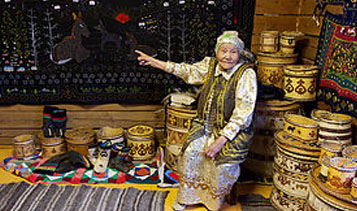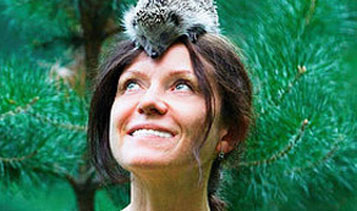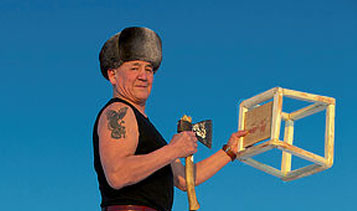
Cold Matters!
June 10, 2015 | Galya Morrell
Tags
My blogs:




Travels with the Nomad:
October 31, 2015 | Galya Morrell
Matters of Health:
June 10, 2015 | Galya Morrell
Russian Telegraph:
May 1, 2015 | Galya Morrell
Travels with the Nomad:
October 31, 2015 | Galya Morrell
Matters of Health:
June 10, 2015 | Galya Morrell
Russian Telegraph:
May 1, 2015 | Galya Morrell
When people invite me to talk about my adventures in the ”hard-to-get-and-hard-to-survive” places, they are genuinely interested in the hardships one has to endure on the road. And no matter what the talk is about, at the end conversation always comes to “matters of health”.
“Isn’t cold bad for your health?” “Don’t you get sick when it is -76F?” “Are there any doctors on the road?” “Is there any way to train to get used to extreme temperatures?”
Everyone says to me: “Stay away from him!” Hedgehogs are dangerous – they carry rabies and other dangerous diseases, that’s what humans say. But humans are dangerous too because they carry forks and instruments of mass destruction, that’s what hedgehogs would say if we listened to them. But somehow, You and I are friends.
You belong to the night, and I belong to the Day. You eat worms, and I eat burgers. Your body is covered by needles and my skin is soft and plain, even boring. But somehow there is an attraction between us.
I did not chose You. You chose me. And I still don’t know why…
Most of the people who ask me these questions will never go to the Pole of Cold along the Road of Bones or cross Bering Strait in a small open boat. So, why would be they so interested in adaptation, survival and acclimatization techniques in situations that are really not applicable to their lives?
I think that the answer is quite simple: subconsciously each of us thinks of the impossible more often than is normally assumed. What will happen if things go wrong? What if everything that we take for granted – cloths, running water, air conditioning systems, supermarkets, buses, roads and even the road signs – are suddenly gone? Can we survive outside of the cocoon?
Can we?
In the last 30 years of my journeys in the Arctic I’ve heard of and personally met many people who were lost in the blizzard or caught by a bad storm and drifted on a small ice-floe into the sea with no warm cloths, tents or food.
The outcomes were quite different.
Some lasted for a day, some for a week, and some for a month.
What exactly differed those people?
You can take a guess and say: those who survived longer had better health. In other words, they must have been fitter, stronger, or healthier. But the history shows that is not always true. Some of the “miracle survivors” were physically much weaker than the others who in similar, or even identical circumstances did not make it. Some of the lucky survivors were women. Some were teenagers, and even children. Some were quite old and fragile.
The more I talked to the survivors, the more I understood that the only real secret of the “miracle survival” in the deadly cold has little to do with the shape of muscles. Rather it has to do with the state of mind, with ability to accept and adapt.
Most people who vanished on a drifting floe of ice refused to accept. They panicked. They stressed out. They rebelled against circumstances instead of cooperating with them. And what is also very important – they pitied themselves and got angry. This is the most important leitmotif of all the “survivals” stories.
So, you may ask, how well do we adapt? And can we measure at all the level of our ability for adaptation?
It’s really hard to check it in the “temperature-controlled” environment since most of us don’t get even close to the situations described above. But yes, there is an indicator – and quite an accurate one. It is our heart rate.
If you control your stresses, if you don’t get constantly angry or upset, if you blood does not rush into your head 10 times a day, if your feet don’t get cold or palms wet, then your heart rate will stay low and stable.
How low?
Two months ago, on one of the coldest mornings on the Pole of Cold in Siberian Oymyakon, I climbed a hill with an old woman; she was 89, the age of my mother. Well, “old” is a slip of a tongue: 89 is not an age in Oymyakon since its residents are known for their extreme longevity. Many have reached 90 and 100, and lived happily after. Some have grown new teeth; some men gave birth to new babies. One common factor: the heart beat of all centenarians is extremely low for today’s world. Around 40-50 in resting position.
In the next few weeks I will write more about the matters of health of Oymakon centenarians, about their food, work and ethic choices, but today I would mention only one thing which can be easily applicable to all of us regardless of our coordinates on the map.
After we reached the top of the hill, my young-old companion said something quietly in Yakutian. “What is it?” I asked. “I thanked my feet”, she said. “Didn’t you thank yours?” No, I did not. The idea of thanking my feet even did not cross my mind. And then she thanked the mountain. And then the Sun. And then her Ancestors who had come here many centuries ago and brought ice wisdom along – the wisdom which she has inherited from them.
How often do we thank? How often do we thank our heart – for beating constantly, day and night, with no rest? Our feet – for walking, for carrying us on the Earth? Our hands – for connecting us to the wonderful things that surround us? Our eyes – for seeing the world and its constant wonders? We are too busy to be thankful even to our own selves, forget about be thankful to the others.
You learn many lessons in Oymyakon, but one is more important than the others especially to those who are interested in the matters of health: if we don’t forget to thank, our heart rate will stay low and stable, there will be no need in all those pink, yellow and white prescription pills that we take daily to survive the daily stress and sicknesses that come along. If we manage to thank – our own selves to begin with, we will live a long life – and what is mostly important – a happy one.






